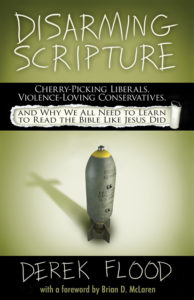Disarming Scripture
 For a while now I’ve had numerous people recommend Derek Flood’s book called Disarming Scripture (see: Amazon link). I see why, as I deeply resonated with much of what Flood writes and the questions he asks about Christianity and the Bible. While he raises some great tensions, I found his solutions for those tensions a bit too reliant on our own subjective criteria. The main topic of this book is what to do with the violence of God in the Bible. Essentially, Flood explains how our common sense and our experiences need to shape what we conclude today. While there is much truth to that, it seems incomplete and opens the door to numerous other topics that are left unresolved. I feel that books like Cross Vision from Greg Boyd (see: my book review) offer a more helpful method of navigating the violent texts objectively.
Nonetheless, Flood raises many thought-provoking ideas and challenges the reader to see things in a fresh way. For that I am truly grateful for a book like this. We need to read books like this on a regular basis—regardless of how much we agree or disagree with—in order to challenge our biases and blind spots. His main idea is that there are two ways of reading the Bible. “The Pharisees are representative of the way of unquestioning obedience, and Jesus is representative of the way of faithful questioning.” Processing whether we are reading the Bible with unquestioning obedience or faithful questioning is a helpful way of framing our interpretations of Scripture.
Below are some of my favorite quotes from the book.
For a while now I’ve had numerous people recommend Derek Flood’s book called Disarming Scripture (see: Amazon link). I see why, as I deeply resonated with much of what Flood writes and the questions he asks about Christianity and the Bible. While he raises some great tensions, I found his solutions for those tensions a bit too reliant on our own subjective criteria. The main topic of this book is what to do with the violence of God in the Bible. Essentially, Flood explains how our common sense and our experiences need to shape what we conclude today. While there is much truth to that, it seems incomplete and opens the door to numerous other topics that are left unresolved. I feel that books like Cross Vision from Greg Boyd (see: my book review) offer a more helpful method of navigating the violent texts objectively.
Nonetheless, Flood raises many thought-provoking ideas and challenges the reader to see things in a fresh way. For that I am truly grateful for a book like this. We need to read books like this on a regular basis—regardless of how much we agree or disagree with—in order to challenge our biases and blind spots. His main idea is that there are two ways of reading the Bible. “The Pharisees are representative of the way of unquestioning obedience, and Jesus is representative of the way of faithful questioning.” Processing whether we are reading the Bible with unquestioning obedience or faithful questioning is a helpful way of framing our interpretations of Scripture.
Below are some of my favorite quotes from the book.
As people of faith we need to face the sobering fact that some parts of our Bible command us to love our enemies, while other parts command mercilessly slaughtering them.
Genocide, infanticide, cannibalism, and rape are all attributed to God in the Old Testament.
A big part of the problem has to do with the assumption that faithfulness to Scripture means accepting everything it says unquestioningly.
Fulfilling Scripture for Jesus means lovingly bringing it into its fully intended purpose.
All the so-called “heresies†throughout history pale in comparison to the hurtful ways that people have been ostracized, threatened, and wounded by those who act as the champions of so-called orthodoxy.
The New Testament is therefore a protest-narrative constituting a major critique of religiously justified violence. But it is more than this: It goes beyond mere critique and protest, and articulates a radical alternative way, characterized by forgiveness and enemy love. This is the core narrative of the New Testament.
Properly interpreting the New Testament—not as detached scholars but as followers of Jesus and his way—thus involves recognizing the redemptive trajectory it sets away from religious violence, and then continuing to develop and move forward along that same trajectory ourselves. In other words, we cannot stop at the place the New Testament got to, but must recognize where it was headed.
The New Testament itself does not represent an ultimate ethic, but instead is representative of the first steps in that new direction. We need to recognize therefore the trajectory they were headed in, and then work to continue to move in that same direction.
In the end, the real problem of violence in the Bible is not so much the particular passages that seem to endorse it, but more significantly a particular way of reading Scripture that shuts down all questioning and conscience.
Do You Want to Read the Bible Without Falling Behind?
Sign up your email and I’ll send you a PDF to download and use my custom-made reading plan system. There’s no way to fall behind on this system and every day will be different no matter how long you use it!
I’ll send future content directly to your inbox AND you can dive into the Bible like never before.




